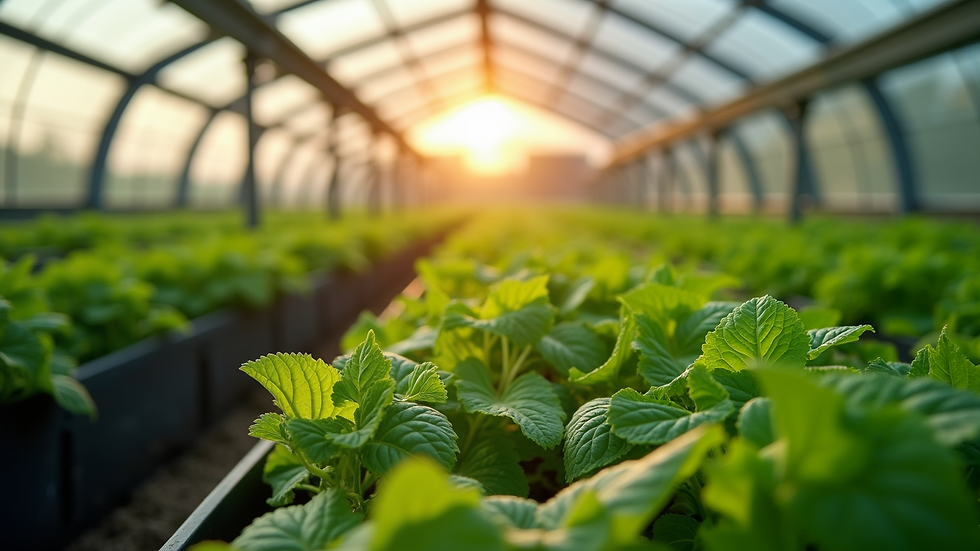The Future of Eco-Friendly Food Production
- Cominski

- Jun 18, 2025
- 4 min read
As the world continues to face the pressing challenges of climate change and resource depletion, sustainable food production is increasingly becoming a focal point for both consumers and producers. Understanding the future of eco-friendly food production involves examining how innovation, technology, and natural practices can come together to create a healthier planet and a more sustainable food system.
What is Sustainable Food Production?
Sustainable food production refers to methods that are environmentally friendly, socially responsible, and economically viable. This includes practices that reduce waste, conserve resources, and promote biodiversity. By focusing on sustainability, we aim to minimize our ecological footprint while still providing the food needed for growing populations.
For example, traditional farming methods often utilize high levels of chemical fertilizers and pesticides, which can harm the soil, water, and surrounding ecosystems. In contrast, sustainable practices such as organic farming, permaculture, and agroecology emphasize natural processes and biodiversity. These methods not only protect the environment but also produce healthier food options free from harmful chemicals.

Innovations in Sustainable Food Production
Technological innovations are helping to reshape the landscape of sustainable food production. For instance, vertical farming integrates advanced technologies like hydroponics and aeroponics to grow food in urban environments. These systems use a fraction of the water required by traditional farming and can produce year-round crops, significantly reducing transportation costs and emissions.
Additionally, the development of lab-grown meats and plant-based protein alternatives is gaining traction. These alternatives are designed to meet the growing demand for protein while decreasing environmental impact. Research indicates that producing plant-based proteins emits significantly fewer greenhouse gases and requires less land and water than conventional livestock production.

Why Consumers Should Care
The choices consumers make in their daily lives have a profound impact on the environment. The demand for sustainable food options is rising, and this trend influences how food producers operate. By choosing locally sourced and sustainably produced foods, consumers can contribute to reduced carbon footprints, less water consumption, and healthier soil.
Statistics reveal that 66% of consumers are willing to pay more for sustainable products, demonstrating a growing awareness of environmental issues. This shift in consumer behavior pressures food companies to adopt more sustainable practices. For example, companies are beginning to embrace ‘farm to fork’ initiatives—to ensure food travels minimal distances and supports local economies.

The Role of Education and Awareness
An essential element of enhancing sustainable food production is education. Raising awareness about the importance of sustainability in food production encourages consumers to make informed choices. Schools, community organizations, and governments play a crucial role in this educational landscape.
Farmers can benefit from training in sustainable practices, which enhances their productivity and protects natural resources. Workshops on organic farming, crop rotation, and integrated pest management teach farmers how to achieve greater yields without compromising the environment.
Encouraging Local Initiatives
One strategy to enhance sustainable practices is through local initiatives. Community-supported agriculture (CSA) is an excellent example, allowing consumers to buy shares of harvests directly from farmers. This model fosters a direct connection between consumers and producers while promoting sustainable practices and local economies.
Additionally, urban gardens and local food co-ops can serve as important platforms for educating people about food sourcing and sustainability. By participating in these initiatives, community members can learn firsthand about sustainable farming, nutritional education, and cooking practices.
Looking Ahead: The Future of Food
The future of sustainable food production is bright yet faces challenges. Climate change, population growth, and resource scarcity demand innovative solutions. This requires a collective effort from all stakeholders—governments, businesses, and consumers alike.
Investing in research and development for new technologies, sustainable practices, and resilient crops is essential. Also, advocating for policies that support sustainable practices in agriculture can lead to systemic change in food production systems. As we prioritize sustainability, we pave the way for a future where food is produced ethically, safely, and with minimal environmental impact.
Furthermore, as we explore alternative food sources—like algae and insect protein—we expand our horizons in sustainable food options. This not only provides nutrition but also presents eco-friendly alternatives to traditional agriculture.
Ways to Contribute to Sustainable Food Production
Educate Yourself: Stay informed about sustainable practices and the importance of food sourcing. Knowledge empowers better choices.
Support Local Farmers: Buy from local markets and participate in CSAs. This strengthens local economies and reduces emissions from transportation.
Reduce Food Waste: Plan meals and store food properly to minimize waste. Composting can further reduce the impact of wasted organic matter.
Choose Organic: Whenever possible, opt for organic and sustainably sourced products. These often have a lower environmental impact.
Advocate for Change: Use your voice to promote policies that support sustainable food manufacturing practices and hold corporations accountable.
By incorporating these practices into your daily life, you contribute to creating a sustainable food system that benefits the environment and future generations.
As we adopt innovative practices and remain committed to sustainability, the future of food production looks hopeful. Through collective efforts and awareness, we can build a world where food production aligns with the health of our planet.




Comments